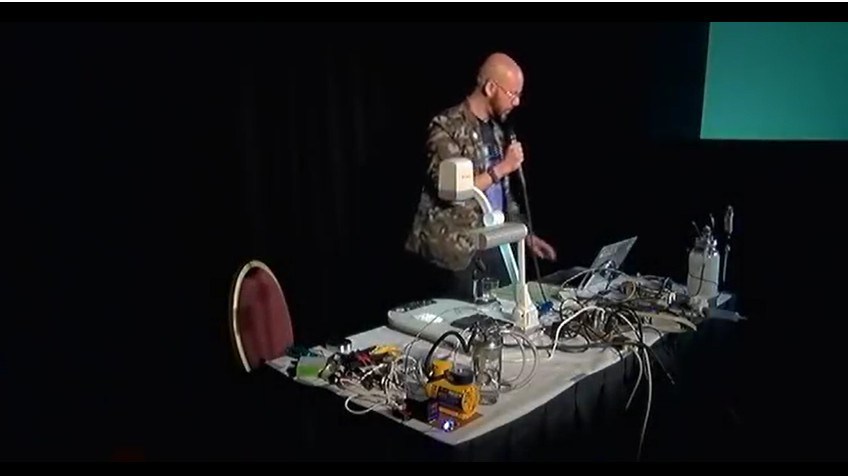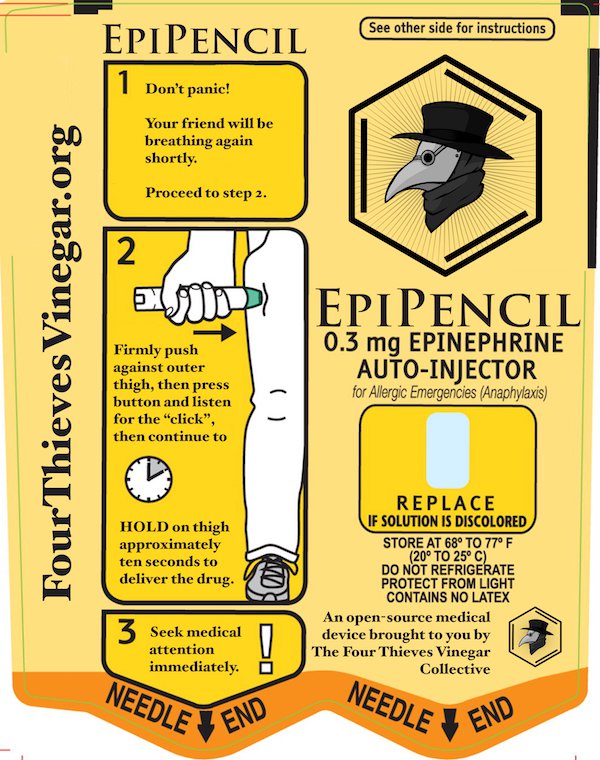Dr. Michael Laufer, Founder and Chief Spokesman of the Four Thieves Vinegar Collective, an anarchist biohacking network, debuted a 3D printable kit for homebrewing medication at the Hackers On Planet Earth (HOPE) Conference in New York City, last month.
Acting as an accessible alternative to industrial chemical reactors, this Apothecary Mircolab is capable of synthesizing homemade medication for HIV, opiate overdoses, and pharmaceutical abortions.
This chemical reactor “can synthesize household poisons into literally a life-saving drug,” said Dr. Laufer in a recent interview.

A 3D printed chemical reactor for “homemade free drugs”
Founded in 2015, the Four Thieves Vinegar Collective began clandestine chemistry (chemistry carried out in secret) to “defend people’s right to attempt their own medical treatment.” With this concept, the Collective has developed and published instructions for a 3D printed Epipen, i.e, the EpiPencil, and the Apothecary MicroLab, an automated DIY device designed to make a variety of medications.
During the 11th HOPE conference in 2016, the Four Thieves Vinegar Collection went public and debuted the first generation of the Apothecary Microlab and EpiPencil. Since then, its DIY chemical reactor has developed, and been involved in hacking medical hardware and more complex drug production processes.
The new and improved Apothecary Microlab consists of a small mason jar mounted inside a larger mason jar with a 3D printed lid. Furthermore, the kit contains a 3D printed stepper motor, syringe pump, coupler and shredded shaft which are connected using small plastic hoses.
A thermistor is then attached through the lid to circulate fluids to induce the chemical reactions necessary to manufacture various medicines. The whole process is automated using a computer.
According to the Collective, the 3D printed chemical reactor kit has successfully produced Naloxone (aka Narcan), a drug for opiate overdoses, Cabotegravir and Daraprim, drugs used to treat infections in people with HIV, and Mifepristone (aka RU486), and misoprostol, two chemicals needed for pharmaceutical abortions.

Open-source medical 3D printing solutions
Additive manufacturing enables a cost-effective alternative to traditionally expensive laboratory equipment. Whether it is used amongst biomedical researchers, or more recently, the general public (as a result of groups such as the Four Thieves Vinegar Collective), the presence of 3D printed customized labware and reaction vessels has increased.
Recently, researchers from Imperial College London (ICL) created an inexpensive open-source 3D printable membrane feeder to facilitate a wider range of laboratories with customizable tools for scientific malaria experimentation.
Prior to this, researchers from New York Genome Center and New York University developed the open-source 3D printed microfluidics control instrument for cell analysis which is 20 to 200 times cheaper than its traditional counterpart.
In addition, new research published in Additive Manufacturing, outlines the potential of 3D printed customizable toolkits and reaction vessels for chemically resistant lab equipment using affordable material and FFF/FDM 3D printers.
Stay abreast of the latest news in 3D printing by subscribing to the 3D Printing Industry newsletter. Also, follow us on Twitter, and like us on Facebook.
On the lookout for new talent or seeking a career change? Search and post 3D Printing Jobs for opportunities and new talent across engineering, marketing, sales and more.
Featured image shows Dr. Michael Laufer with the 3D printed chemical reactor kit at the HOPE conference. Image via Michael Laufer/Youtube.


